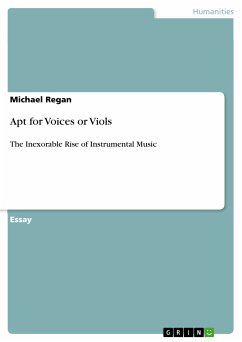Essay from the year 2012 in the subject Sociology - Media, Art, Music, , language: English, abstract: “…music grew too proud to be the garment of words.” (W.B. Yeats) This, by a poet who was, allegedly, tone deaf, is nevertheless a concise but very astute summing up of what has happened to music since about the end of the 16th century. Yeats’ definition of music as “the garment” of words suggests admirably an earlier relationship of music to text- both adorning it and taking its form from it, as we can observe in the mass, motet, madrigal and other Medieval and Renaissance vocal forms in which the musical structures are largely determined by the words set. But after about 1600 music began to dissociate itself from words in earnest and go its own way, and the main cause of this was the rise in popularity of music purely for instruments. Of course there was instrumental music before 1600- lute and keyboard pieces for example, but it had been subsidiary and had never taken the chief place in the output of composers as it was increasingly to do in later times. Also it was very much bound up with the dances of the period- pavanes, galliards and so on- and therefore not so much music for listening to as for directing and co-ordinating bodily movements. What was new in the history of Western music after 1600 was the rapid rise of what another profound thinker about music, Ernst Krenek refers to as “autonomous music”- symphonies, concertos, string quartets, sonatas and fantasies etc., expressly written to be listened to and appreciated as things of beauty and value in their own right, and serving no extra- musical purpose.
Bitte wählen Sie Ihr Anliegen aus.
Rechnungen
Retourenschein anfordern
Bestellstatus
Storno









